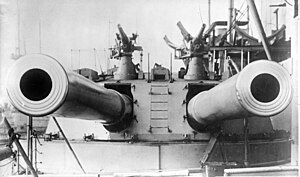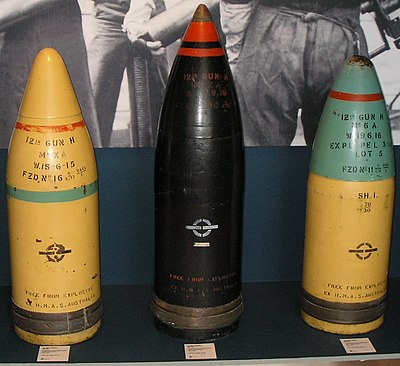BL 12-inch Mk X naval gun
| BL 12-inch gun Mk X | |
|---|---|
 | |
| Type | Naval gun |
| Place of origin | United Kingdom |
| Service history | |
| In service | 1906 – 1923 |
| Wars | World War I |
| Production history | |
| Designer | Vickers |
| Manufacturer | Vickers |
| Unit cost | £9800 (1907)[1] |
| Specifications | |
| Mass | 57 tons barrel & breech[2] |
| Barrel length | 45 feet (13.72 m) bore (45 cal) |
| Shell | 850 pounds (385.6 kg) Lyddite, Armour-piercing, Shrapnel[3] |
| Calibre | 12 inches (304.8 mm) |
| Breech | Welin interrupted screw |
| Muzzle velocity | 2,700 ft/s (823 m/s)[4] |
| Maximum firing range | 22,860 m (25,000 yd)[5] |
The BL 12 inch Gun Mark X[note 1] was a British 45-calibre naval gun which was mounted as primary armament on battleships and battlecruisers from 1906. It first appeared on HMS Dreadnought.
History
[edit]

The Mk X continued the trend of lengthening gun barrels as far as new construction methods would permit, in order to allow more cordite propellant to be used to attain higher projectile velocities. The Mk X increased the bore length from the Mk IX's 480 to 540 in (12 to 14 metres), increasing muzzle velocity from 2,600 to 2,700 ft/s (790 to 820 m/s).
Subsequent British attempts to further increase the power of 12-inch guns led to failure with the 50-calibre Mk XI and Mk XII guns; the Mk X was the last successful 12-inch British gun.
Naval use
[edit]Mk X guns were mounted in the following ships which served throughout World War I:
- Lord Nelson-class battleships, laid down 1905, completed 1908
- Battleship HMS Dreadnought, laid down 1905, completed 1906
- Invincible-class battlecruisers, laid down 1906, completed 1908–1909
- Bellerophon-class battleships, laid down 1906, completed 1909
- Indefatigable-class battlecruisers, laid down 1909, completed 1911–1913
World War I use ashore
[edit]From 1917 several Mk X guns were deployed ashore on the section of the Belgian coast still held by the Allies, near Nieuwpoort. They were part of the "Royal Naval Siege Guns" under the command of Admiral Sir Reginald Bacon, and were used for attacking German heavy gun batteries.
Ammunition
[edit] |
 |
 |
65 lb Cordite Cartridge ¼ charge : i.e. 4 such cartridges were normally loaded to fire the gun
|
Mk VIIA Common Pointed shell with Cap (CPC) filled with gunpowder, 1912
|
World War I Shells. Left to Right :
|
See also
[edit]Weapons of comparable role, performance and era
[edit]- 305mm/45 Modèle 1906 gun French equivalent
- EOC 12 inch /45 naval gun Elswick Ordnance Company equivalent
- 12"/45 caliber Mark 5 gun US equivalent
Notes
[edit]- ^ Mark X = Mark 10. Succeeding versions were Mark XI (11) and XII (12). Britain used Roman numerals to denote Marks (models) of ordnance until after World War II
References
[edit]- ^ "H.M.S. "Dreadnought"—Cost of Armaments. (Hansard, 25 March 1907)". Parliamentary Debates (Hansard). 25 March 1907.
- ^ "BR 12in 45cal BL Mk X". navalhistory.flixco.info. Retrieved 9 November 2018.
- ^ 850 lb shells : Treatise on Ammunition, 1915
- ^ 2700 ft/second : As quoted in "Range Tables for His Majesty's Fleet, 1910. February, 1911"; with 260 lb cordite MD size 45 propellant : Treatise on Ammunition, 1915
- ^ 22,860 metres quoted at : http://navalhistory.flixco.info/H/76624x53535/8330/a0.htm This is understood to be the maximum possible range at 45° elevation, which was possible for siege mountings on land but not for naval mounts
Bibliography
[edit]External links
[edit]- Tony DiGiulian, British 12"/45 (30.5 cm) Mark X
